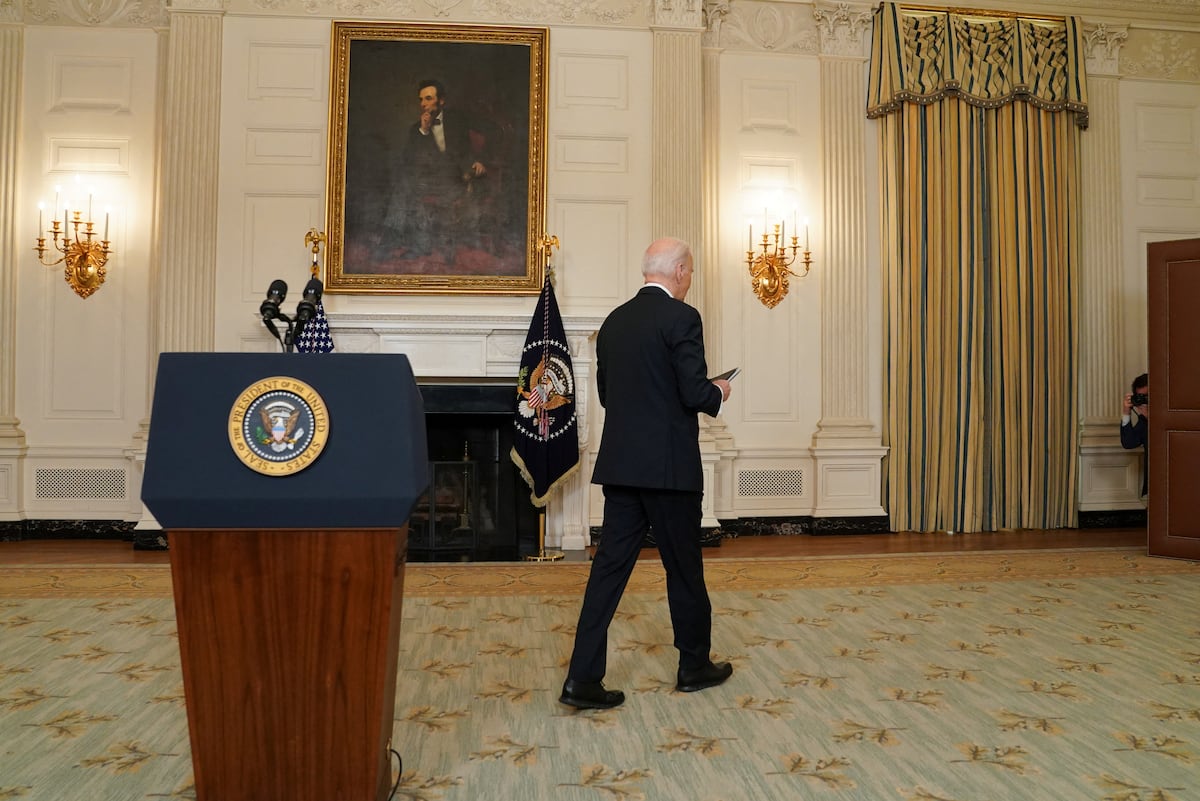Hugues Clepkens is honorary regional administrator and president of the Club Marc Bloch.
Benjamin Morel is a lecturer at the University of Paris 2 Panthéon-Assas and a member of the Club Marc Bloch.
In the haze of immediate, permanent and non-hierarchical information, it is essential to come back to some basic and simple data.
We bet that the future President of the Republic, whose first competence is to ensure respect for the Constitution, finally honors this supreme obligation.
In this case, both the candidates for office and its future incumbent will endeavor to leave Parliament's hands free to carry out the essential local reform that our country has needed so much for decades.
Indeed, according to article 35 of our Constitution, “The law determines the fundamental principles of the free administration of local authorities, their powers and their resources”.
Where are we ?
After major reforms passed between 1970 and the beginning of the 1980s, the following period until now has been punctuated by a multitude of inappropriate laws, most often abstruse, in any case ineffective and costly.
The result is that the French local system has become incomprehensible for citizens and, moreover, constraining, even ineffective.
One of the best specialists in the field titles one of his recent articles: “Decentralization 40 years later: A disaster”1.
In 2018, the club Marc Bloch had written, for its part, that
“the system, so solid in appearance, is falling apart”
, echoing the opinions expressed in dozens of public official reports.
Illustrations abound and the consequences are concretely measured in the decrease in participation in local elections.
Read alsoChristophe Guilluy: “Territorial reform weakens the political power of local elected officials”
Commentators who were in too much of a hurry have certainly noted that this had been low for the municipal elections of 2020 and the departmental and regional elections of 2021, but they had not taken care to study the phenomenon which appeared from those from 1995 to 2001. Already, the percentage of abstentions in the first round, in cities with more than 10,000 inhabitants, had reached or even exceeded 50% of registered voters. We have descended now, to the same level as for the last national elections, and the candidates finally elected, collected, in the first round, only 10 to 15% of the votes of the registered voters. Admittedly legal, an election obtained under such conditions deprives the elected official of legitimacy for the entire duration of his mandate and this is felt by the citizens who turn away from local public life and verbally attack it,even physically, to those they no longer consider their representatives; this is what emerges from the latest statistics published by the Ministry of the Interior which show 605 mayors or deputies assaulted in 2021, i.e. 40% more than the previous year.
It was first of all these “large” regions created supposedly to allow them to measure up to that of other European countries.
Needless to insist on the heresy which led to put in the same bag Poitiers and Biarritz or Épernay and Strasbourg!
Hugues Clepkens and Benjamin Morel
After a few years of decentralizing effervescence until around 1985, the vigor of the following reforms withered and was lost in a magma of increasingly indigestible and technocratic provisions, until the disastrous texts of the years 2014-2015 and, even more, now.
It was first of all these “large” regions created supposedly to enable them to measure up to that of other European countries.
Needless to insist on the heresy which led to put in the same bag Poitiers and Biarritz or Épernay and Strasbourg!
No historical, geographical or sociological logic justified such a choice;
voters were not mistaken since they showed no enthusiasm to vote in such a context.
At the same time, we misled the
idea of inter-municipal cooperation by imposing, here too, a territorial field that is too vast to exercise powers withdrawn from the municipalities, without taking into account the realities on the ground.
So much so that in many areas, no one knows a priori who should do what!
And as if all this were not enough, through a new bill – fortunately becalmed in Parliament, for the moment – we hope to complicate the system even more by facilitating pseudo-experimentation and the adaptation of local skills to places and circumstances.
Don't throw any more, the cup is full...
who should do what!
And as if all this were not enough, through a new bill – fortunately becalmed in Parliament, for the moment – we hope to complicate the system even more by facilitating pseudo-experimentation and the adaptation of local skills to places and circumstances.
Don't throw any more, the cup is full...
In terms of local finances, the height of bluster was reached by withdrawing local authorities the right to vote their own taxes while advocating in all tones that we were in favor of "proximity", especially in the " rurality" and "urban areas"... First, the housing tax was abolished in the regions, then the measure was extended to the municipalities, under the pretext of reducing the tax burden weighing on households and in leaving as a link between the elected municipal official and the citizen, only the property tax, whose tax base is generously - but discreetly - increased each year by the finance law...
With regard to the heart of political power, in this case the vote and the use of local taxes, the French have been fooled for years.
Hugues Clepkens and Benjamin Morel
But who can believe what the Ministry of Economy and Finance has written?
“This historic measure restores more than €18 billion in additional purchasing power to the French.
The average gain will amount to an average of €723 per household, for all French people.
As the same people "promised" that the loss of revenue would be entirely compensated for by the national budget, this means that it will be necessary either to take 18 billion from it, when its annual deficit already exceeds 150 billion, or to competitive "savings", or both.
It is therefore a lure waved before the noses of voters as was the reform of another major local tax, the old business tax.
This was replaced by a new system in 2010, which required the national budget to pay around 8 billion in compensation to local authorities each year.
8 billion since 2010!
12 years this year, a total of 96 billion, which no one ever talks about... In short, with regard to the heart of political power, in this case voting and
In addition, there are approximately 2 million local agents and 1.4 million retirees, ie 3.4 million individuals whose remuneration depends on the value of the famous “point” of the civil service.
Since 2010, the difference between the latter and inflation has reached more than 16%.
If the average salary of a local agent amounts to €2,000, and the average income of a pensioner to €1,200, it is easy to assess the "savings" made by local authorities on the back of their officers.
In other words, if local authorities had had to pay their active and retired agents an average income that would evolve like inflation, their budget would now be in the bright red;
which means that the budgetary equilibrium of these could only be achieved by making them pay the price, without anyone
The power to intervene rests with Parliament;
the expression used here acknowledges the reduction of the role of the law to the simple implementation of a presidential will devoid of any legitimacy.
Hugues Clepkens and Benjamin Morel
Who can claim that he is able to make a clear and comprehensible presentation of the relations between the communes and their communities?
Let us only note that one of the associations of elected officials concerned, the Association of French Communities, is calling for a complete revision of the methods for measuring these relations, which have significant consequences on the resources of each other.
What is significant in this case is the conclusion it draws: “The association intends to make proposals on this subject within the framework of the new presidential mandate.”
However, as we recalled above, it is Parliament that has the power to intervene;
the expression used here acknowledges the reduction of the role of the law to the simple implementation of
It is by affirming the recognition of a real local power, and not of an "administrative decentralization" just good enough to manage the affairs of which the State would be freed, that we will succeed in re-establishing solid foundations under all the national building.
This renovation of local power will be based on an organization of the country with two levels of communities;
i.e. municipalities of around 5 to 10,000 inhabitants in the countryside, at least 30,000 in towns and 40 to 45 departments/regions the size of 2 or 3 current departments, instead of the existing divisions.
The elections would be organized in new constituencies, namely the town in the countryside and the neighborhood in town2.
Citizens could be more genuinely involved in the management of local public services so that they stop
It would be a question of a reform of the country, certainly in-depth, but the only one capable of giving it back the democratic vigor essential to get it out of the confusion and torpor in which it is in the process of losing its collective soul and mortgaging its to come up.
It would also be one of the essential elements for the restoration of the Republic whose Constitution must, also and obviously, be modified in the same direction.
[1]: Jean-Bernard Auby, text to be published in the blog "Journal du droit administratif".
[2]: The details of the project can be consulted in “Citizen!
Plea for a renewed local democracy”.
Ed. L’Harmattan, 2018.


/cloudfront-eu-central-1.images.arcpublishing.com/prisa/TZD5OV325LCRZNEHH7JWAEA74U.jpg)











